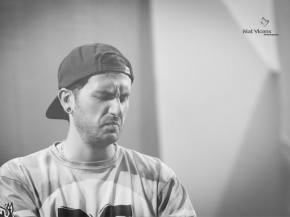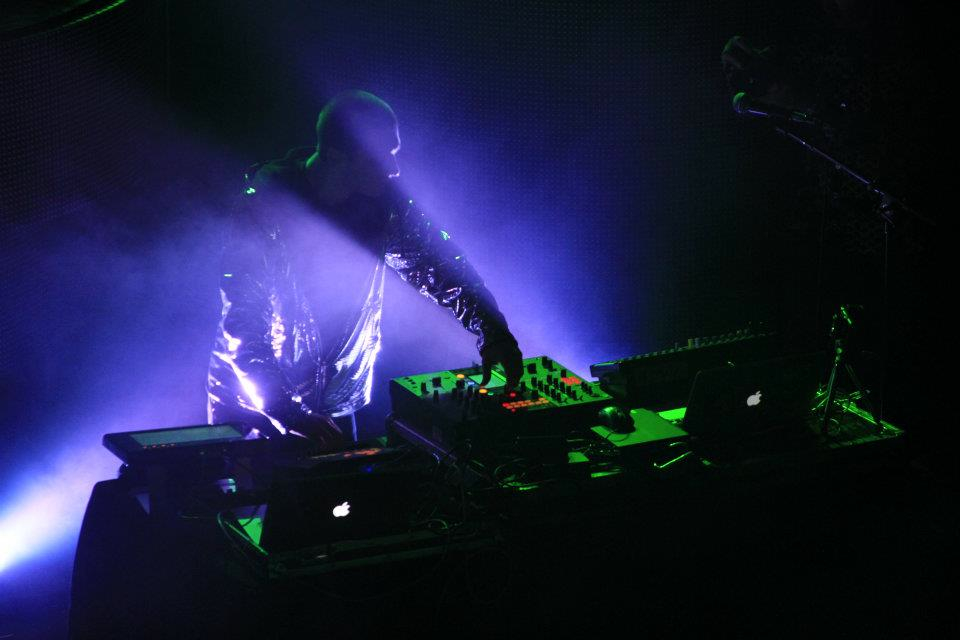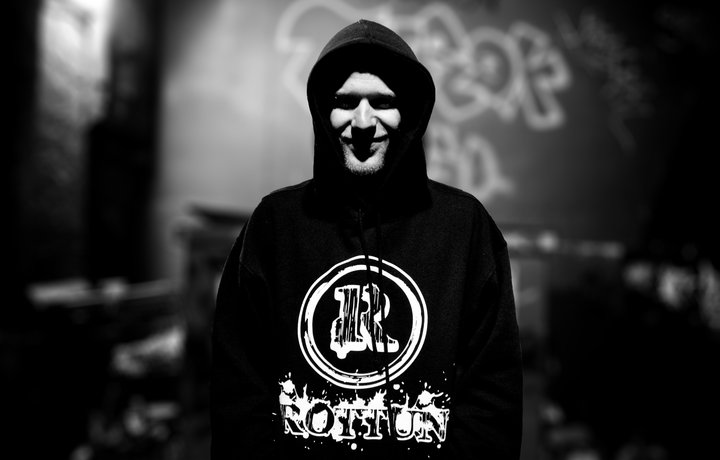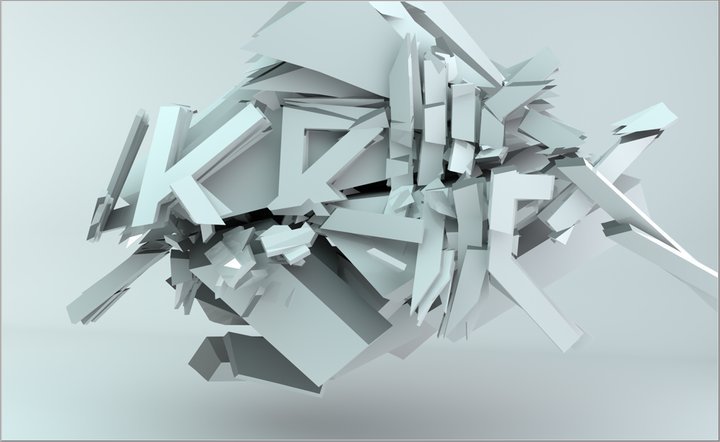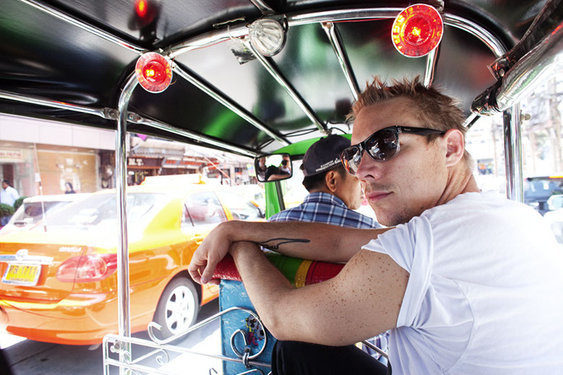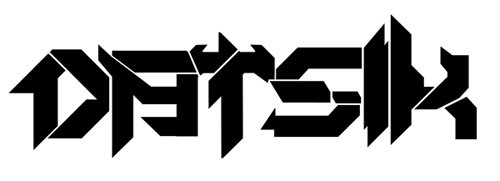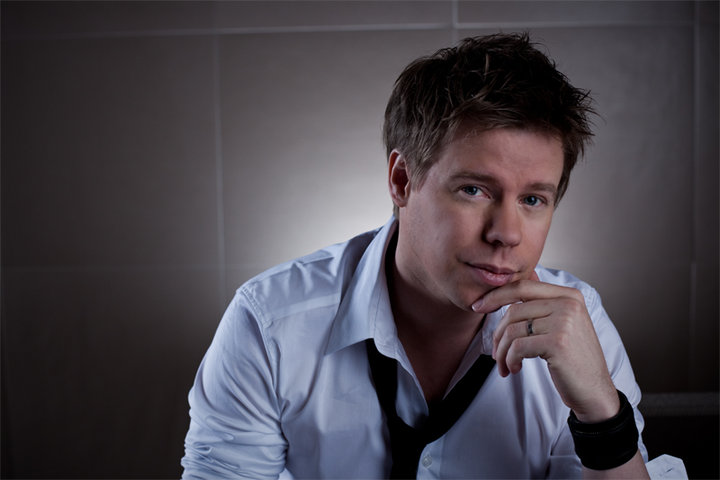Published: June 27, 2012
Spring Awakening Music Festival 2012 Review + Photo Slideshow / Soldier Field (Chicago, IL) / 6.16.12 + 6.17.12
Photos By: Cory Giacalone (Jackafunk Photography) ; Article By: Natty Morrison
I arrived at Spring Awakening with a lot on my mind. Standing smack-dab in the middle of downtown Chicago at the historic Soldier Field, it was difficult to not imagine this, Chicago’s first all-dance music festival, as some sort of symbolic moment in EDM. The recent success of similar festivals like Lightning In a Bottle, Electric Daisy Carnival, and last year’s Identity Fest has served as evidence for the growing mainstream acceptance of electronic music. But this is Chicago; this is the heart of the Midwest. And while dance music has generally been defined in terms of genre, it’s also understood in terms of location. The UK had acid house. Detroit made techno. The west coast turned bass music upside down. But Chicago? Chicago had house. And while house has given way to newer, more aggressive sounds of dubstep or electro, that aesthetic of a Midwest sound still exists. Much like an accent can identify a native speaker origins, the rage-happy sounds of Chicago dance music are like a colloquialism, something that lets Midwesterners like myself know that we’re home. So I was intrigued to see how the festival would interpret this historic moment.
Along with the big-name artists that stocked the line-up, there was still a healthy number of Chicago up-and-comers throughout the festival. LoBOUNCE, who I first saw playing packed bills in small clubs like the Kinetic Playground, was one of the first acts to take the main stage inside the stadium on Saturday. Though the grounds were still filling with concertgoers, a swelling crowd came to watch LoBOUNCE (aka Giancarlo Pasquesi) spit out his signature “drippy bass” sound, and young Carlo did not disappoint. Despite some onstage technical difficulties, those in attendance were quickly whipped into a dancing frenzy, thanks to his thunderous, stuttering bass lines and some of the best dance moves from a DJ I’ve ever seen. It also set the stage for that aforementioned New-Chicago sound, full of agro-bass and a hip-hop intensity that would be spread throughout the fest.
With the hot weather reaching unbearable levels, I ducked into the Equinox tent to seek some shade. Instead, I found one of the most impressive sets of the weekend, courtesy of Downlink. A massive wall of sound instantly blew my hair back. Literally. The levels were mixed perfectly, and the ever-enthusiastic Downlink dropped bass blasts so hard that, when standing in front of the speakers, created a wind. Somehow, though, he was able to find a perfect balance of sounds that were both overwhelming and exhilarating, all without becoming too intense for comfort. This was yet another thing that Spring Awakening got right: the sound system. Too often I’ve seen large venues such as this unable to nail the sonic arrangements simply due to size. But React Presents, along with its many partners did an excellent job of providing top-notch sound quality at every stage I visited.
Throughout much of Spring Awakening, amidst the strains of electro and dubstep, I found myself staring up at the Chicago skyline and asking myself, “Where’s the house music?” Luckily for me, my answer came in the form of Nathan Scott’s midday set. The Chicago-based DJ has been honing his pure house sound for the past seven years, acting as a resident DJ on the XM BPM station and generally keeping the Chicago sound alive. I was thrilled to hear the music that, along with trance, originally got me into dance music, and the crowd seemed to agree, grooving along to old-school sounds that I had feared had gone extinct.
Ultimately though, Saturday night undoubtedly belonged to Skrillex. All across the festival grounds, his name was impossible to escape. Fans wore shirts reading, “Drop it extra hard, Skrilly!” Everyone from 3LAU to Benny Benassi played Skrillex remixes. And with the sudden influx of fans streaming through the gates as his set time neared, it became apparent that this was Skrillex’s night. Assuredly the world’s biggest EDM artist, Skrillex has become a household name for both hardcore dance music fans and casual listeners. Simultaneously heralded as a game changer and scolded as some sort of pariah, there has been a growing debate as to the effects or validity of Sonny Moore’s contributions to electronic music. But all that seemed to be washed away, as Skrillex’s massive onstage spaceship rolled out and he began unleashing his lethal saw blade bass and absurdly glitched drum breaks on attendees. Even the sudden rainstorm couldn’t extinguish the fires being set by aggressive, intense dancing in the crowd. In fact, audience members seemed to take the storm as some sort of challenge, dancing harder as each gust and bass squall kicked up.
Along with Skrillex, though, one of the most anticipated sets came from Diplo on Sunday evening. And though there were plenty of mammoths in the EDM scene across the bill, it’s hard to imagine one who’s had more influence on both dance and popular music than Diplo (aka Thomas Wesley Pentz). Founder of Mad Decent records, one half of Major Lazer, and star-maker responsible for geniuses such as M.I.A., Diplo’s presence can be felt all across the dance music scene. So to have the chance to see him rocking the Equinox stage felt like some sort of a pilgrimage. He’s also probably the only person who can drop Blur’s “Song 2,” and keep a crowd raging, without any hint of irony.
Considering the huge presence of dubstep - particularly heavy dubstep – it would be difficult to imagine the scene as it is today without Datsik. Along with Skrillex and Diplo, Datsik is responsible for some of the biggest and most widely played singles in his genre’s history. And when I hear Beatport number 1 hit songs like, “Swagga,” or “Firepower” dropped in nearly every bass music DJ’s set, it can be easy to forget that Datsik (Troy Beetles) is the one responsible for it. Watching the young producer playing all of these now-legendary and extremely important tunes himself felt similar to seeing Nirvana play, “Smells Like Teen Spirit,” in 1990. Something about it felt pure, as though I had stumbled upon the source.
As I wandered around the festival grounds, I became increasingly interested by the representation of current rave culture, whatever that may be or mean. This was, after all, Chicago’s first all-dance music festival, and to have it inside Soldier Field is Exhibit A in the mainstream crossover of EDM. So what, I wondered, does this mean for scene from which it all began? Obviously we’re miles away from warehouse parties and underground raves in the era of club kids in the 1990s. This is something more widespread than those grassroots beginnings; one might even call it a new form of pop music. There was, however, one point during the weekend that seemed to hearken back to dance music’s purist beginnings. During trance legend Ferry Corsten’s set on Saturday night, the lights dropped down and the music faded away. All that remained was a lingering piano line, filtered through the haunting, natural reverb of the stadium. As the opening strains of Corsten’s, “Not Coming Down,” began to build, singer Betsie Larkin asserted that, “I'm sure that the world that I see in my mind is changed.” I started thinking about all the changes in dance music, and all the debates over the greatest eras of EDM, or whether the so-called new school was ruining the ways of the old. But as I let my eyes drift across the crowd, and the ethereal glow from the slow crescendo of lights and sound swept over the sweaty masses, I let my eyes unfocus and blur. And at that moment, I no longer saw genres or eras or new versus old debates. I only saw dance music fans, swaying and rising together. One fan stood atop friends’ shoulders, arms outstretched and embracing the gorgeous trance build. It was then that I realized, dance music is not about beginnings or ends; dance music is about a moment. That intangible, indescribable moment of auditory magnificence, and the feeling of everyone around you being in that moment too. This, ultimately, was Spring Awakening’s greatest success: They created a moment in Chicago, the city where it all began, in which dance music reigns supreme. And regardless of where it all may be headed, that’s something to feel great about.
Photos By: Cory Giacalone (Jackafunk Photography) ; Article By: Natty Morrison
I arrived at Spring Awakening with a lot on my mind. Standing smack-dab in the middle of downtown Chicago at the historic Soldier Field, it was difficult to not imagine this, Chicago’s first all-dance music festival, as some sort of symbolic moment in EDM. The recent success of similar festivals like Lightning In a Bottle, Electric Daisy Carnival, and last year’s Identity Fest has served as evidence for the growing mainstream acceptance of electronic music. But this is Chicago; this is the heart of the Midwest. And while dance music has generally been defined in terms of genre, it’s also understood in terms of location. The UK had acid house. Detroit made techno. The west coast turned bass music upside down. But Chicago? Chicago had house. And while house has given way to newer, more aggressive sounds of dubstep or electro, that aesthetic of a Midwest sound still exists. Much like an accent can identify a native speaker origins, the rage-happy sounds of Chicago dance music are like a colloquialism, something that lets Midwesterners like myself know that we’re home. So I was intrigued to see how the festival would interpret this historic moment.
Along with the big-name artists that stocked the line-up, there was still a healthy number of Chicago up-and-comers throughout the festival. LoBOUNCE, who I first saw playing packed bills in small clubs like the Kinetic Playground, was one of the first acts to take the main stage inside the stadium on Saturday. Though the grounds were still filling with concertgoers, a swelling crowd came to watch LoBOUNCE (aka Giancarlo Pasquesi) spit out his signature “drippy bass” sound, and young Carlo did not disappoint. Despite some onstage technical difficulties, those in attendance were quickly whipped into a dancing frenzy, thanks to his thunderous, stuttering bass lines and some of the best dance moves from a DJ I’ve ever seen. It also set the stage for that aforementioned New-Chicago sound, full of agro-bass and a hip-hop intensity that would be spread throughout the fest.
With the hot weather reaching unbearable levels, I ducked into the Equinox tent to seek some shade. Instead, I found one of the most impressive sets of the weekend, courtesy of Downlink. A massive wall of sound instantly blew my hair back. Literally. The levels were mixed perfectly, and the ever-enthusiastic Downlink dropped bass blasts so hard that, when standing in front of the speakers, created a wind. Somehow, though, he was able to find a perfect balance of sounds that were both overwhelming and exhilarating, all without becoming too intense for comfort. This was yet another thing that Spring Awakening got right: the sound system. Too often I’ve seen large venues such as this unable to nail the sonic arrangements simply due to size. But React Presents, along with its many partners did an excellent job of providing top-notch sound quality at every stage I visited.
Throughout much of Spring Awakening, amidst the strains of electro and dubstep, I found myself staring up at the Chicago skyline and asking myself, “Where’s the house music?” Luckily for me, my answer came in the form of Nathan Scott’s midday set. The Chicago-based DJ has been honing his pure house sound for the past seven years, acting as a resident DJ on the XM BPM station and generally keeping the Chicago sound alive. I was thrilled to hear the music that, along with trance, originally got me into dance music, and the crowd seemed to agree, grooving along to old-school sounds that I had feared had gone extinct.
Ultimately though, Saturday night undoubtedly belonged to Skrillex. All across the festival grounds, his name was impossible to escape. Fans wore shirts reading, “Drop it extra hard, Skrilly!” Everyone from 3LAU to Benny Benassi played Skrillex remixes. And with the sudden influx of fans streaming through the gates as his set time neared, it became apparent that this was Skrillex’s night. Assuredly the world’s biggest EDM artist, Skrillex has become a household name for both hardcore dance music fans and casual listeners. Simultaneously heralded as a game changer and scolded as some sort of pariah, there has been a growing debate as to the effects or validity of Sonny Moore’s contributions to electronic music. But all that seemed to be washed away, as Skrillex’s massive onstage spaceship rolled out and he began unleashing his lethal saw blade bass and absurdly glitched drum breaks on attendees. Even the sudden rainstorm couldn’t extinguish the fires being set by aggressive, intense dancing in the crowd. In fact, audience members seemed to take the storm as some sort of challenge, dancing harder as each gust and bass squall kicked up.
Along with Skrillex, though, one of the most anticipated sets came from Diplo on Sunday evening. And though there were plenty of mammoths in the EDM scene across the bill, it’s hard to imagine one who’s had more influence on both dance and popular music than Diplo (aka Thomas Wesley Pentz). Founder of Mad Decent records, one half of Major Lazer, and star-maker responsible for geniuses such as M.I.A., Diplo’s presence can be felt all across the dance music scene. So to have the chance to see him rocking the Equinox stage felt like some sort of a pilgrimage. He’s also probably the only person who can drop Blur’s “Song 2,” and keep a crowd raging, without any hint of irony.
Considering the huge presence of dubstep - particularly heavy dubstep – it would be difficult to imagine the scene as it is today without Datsik. Along with Skrillex and Diplo, Datsik is responsible for some of the biggest and most widely played singles in his genre’s history. And when I hear Beatport number 1 hit songs like, “Swagga,” or “Firepower” dropped in nearly every bass music DJ’s set, it can be easy to forget that Datsik (Troy Beetles) is the one responsible for it. Watching the young producer playing all of these now-legendary and extremely important tunes himself felt similar to seeing Nirvana play, “Smells Like Teen Spirit,” in 1990. Something about it felt pure, as though I had stumbled upon the source.
As I wandered around the festival grounds, I became increasingly interested by the representation of current rave culture, whatever that may be or mean. This was, after all, Chicago’s first all-dance music festival, and to have it inside Soldier Field is Exhibit A in the mainstream crossover of EDM. So what, I wondered, does this mean for scene from which it all began? Obviously we’re miles away from warehouse parties and underground raves in the era of club kids in the 1990s. This is something more widespread than those grassroots beginnings; one might even call it a new form of pop music. There was, however, one point during the weekend that seemed to hearken back to dance music’s purist beginnings. During trance legend Ferry Corsten’s set on Saturday night, the lights dropped down and the music faded away. All that remained was a lingering piano line, filtered through the haunting, natural reverb of the stadium. As the opening strains of Corsten’s, “Not Coming Down,” began to build, singer Betsie Larkin asserted that, “I'm sure that the world that I see in my mind is changed.” I started thinking about all the changes in dance music, and all the debates over the greatest eras of EDM, or whether the so-called new school was ruining the ways of the old. But as I let my eyes drift across the crowd, and the ethereal glow from the slow crescendo of lights and sound swept over the sweaty masses, I let my eyes unfocus and blur. And at that moment, I no longer saw genres or eras or new versus old debates. I only saw dance music fans, swaying and rising together. One fan stood atop friends’ shoulders, arms outstretched and embracing the gorgeous trance build. It was then that I realized, dance music is not about beginnings or ends; dance music is about a moment. That intangible, indescribable moment of auditory magnificence, and the feeling of everyone around you being in that moment too. This, ultimately, was Spring Awakening’s greatest success: They created a moment in Chicago, the city where it all began, in which dance music reigns supreme. And regardless of where it all may be headed, that’s something to feel great about.


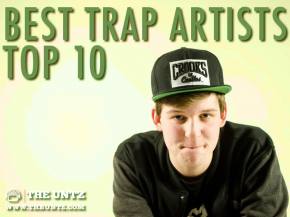
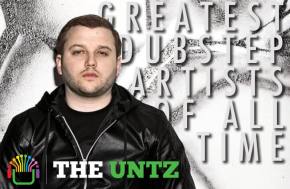
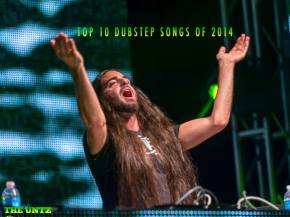
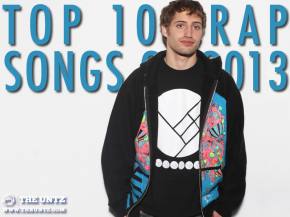
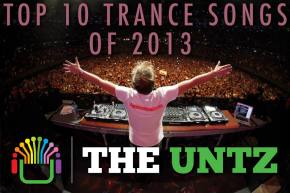
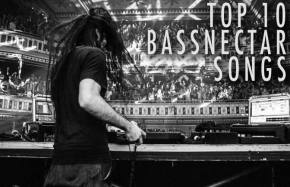
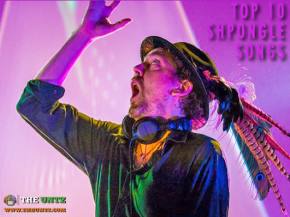
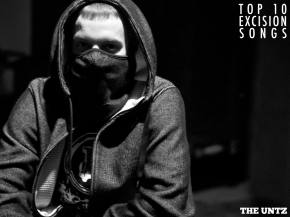
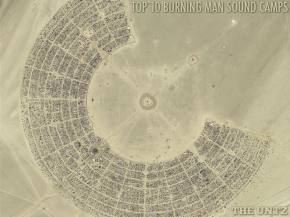
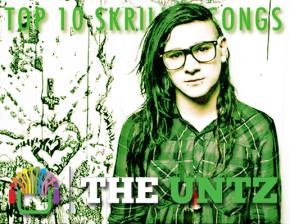
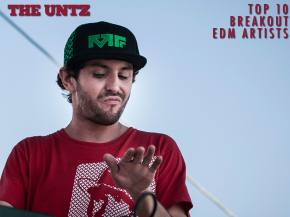
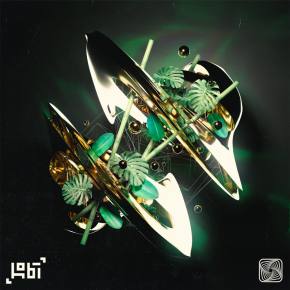
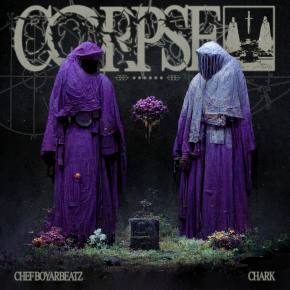
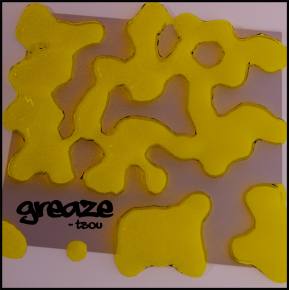
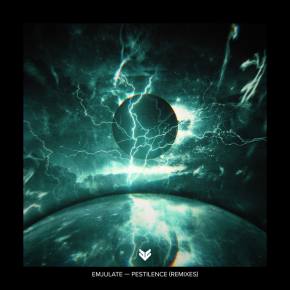
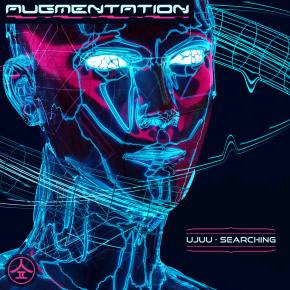
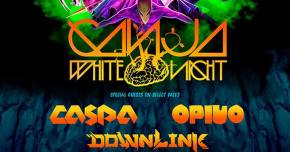
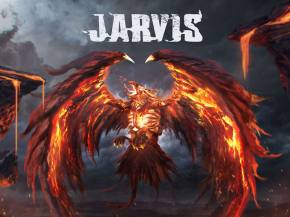
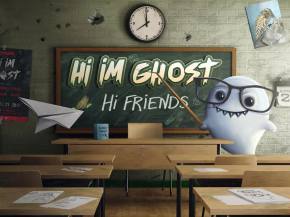
![Tisoki & Jarvis unload new single on Firepower Records [INTERVIEW] Preview](https://www.theuntz.com/media/news/6/3/7/6370/tisoki-and-jarvis-unload-new-single-on-firepower-records-interview.jpg)
